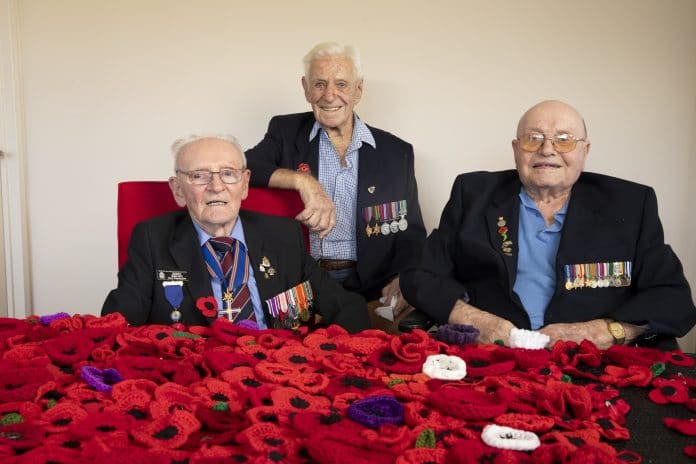Like many young men growing up in NSW during the 1920s and 30s, Private Kenneth McKenzie lied about his age so he could serve in World War Two.
When the scout from the 2nd/3rd Machine Gun Battalion was sent to Dutch New Guinea on his 20th birthday, 27th June 1942, he’d already served 755 days within the Australian Imperial Forces.
The young man from Kyogle, born the youngest of 16, served a total of 1597 days in the military, 775 of them in the mountainous marshes of New Guinea.
By the time he was discharged in June 1946, the tall, lanky lad who’d enlisted in Paddington, had witnessed first-hand the atrocities of war.
On Monday 25th April Ken will join fellow veterans Alf Carpenter and Ziggy Gnojek in an Anzac Day commemorative service at Waratah’s Maroba Caring Community, where they reside.
The annual ceremony, which features guest speakers, a bugle rendition of The Last Post and one-minute’s silence, will this year include the unveiling of The Poppy Project – a 5-metre wall of hand-made red poppies that will be permanently draped over a rock in the centre’s main courtyard.
The project boasts more than 1,000 poppies and has drawn the attention of residents for more than six months.
Maroba’s director of care Linda Winn says the result has truly been a team effort.
“We’ve lost count of the number of people who have contributed to this project,” she said.
“We have poppies just being dropped off at the door. The support has been wonderful. It could be at least 2 dozen and more.
“Residents, family members ,friends, the local Knitters Guild and community members not connected to Maroba have all donated to our project.
“We have poppies that have been knitted, crocheted with wool, and old t-shirts, fabric poppies, felt poppies, poppies with a knitted leaf attached, poppies with buttons, poppies with fluffy wool bits in the centre, big ones, little ones and medium size ones, all in a different shade of red.
“They are all unique just like the people who served in the war,” Ms Winn says.
“We also have purple ones to represent the animals that passed, and 21 white poppies will be attached to represent 21 nurses that died.”
Sixty-five nurses from the Australian Army Nursing Service sailed from Singapore on 12 February 1942 to assist in the war efforts.
Two days later the ship was bombed and sunk.
The survivors struggled ashore on Bangka Island, but on 16 February, at Radji Beach, 22 of the nurses and one civilian woman were marched into the sea where they were machine-gunned.
Ms Win says the 21 poppies represent the brave and courageous nurses who lost their life that day while serving their country.
“We will never forget them”.







